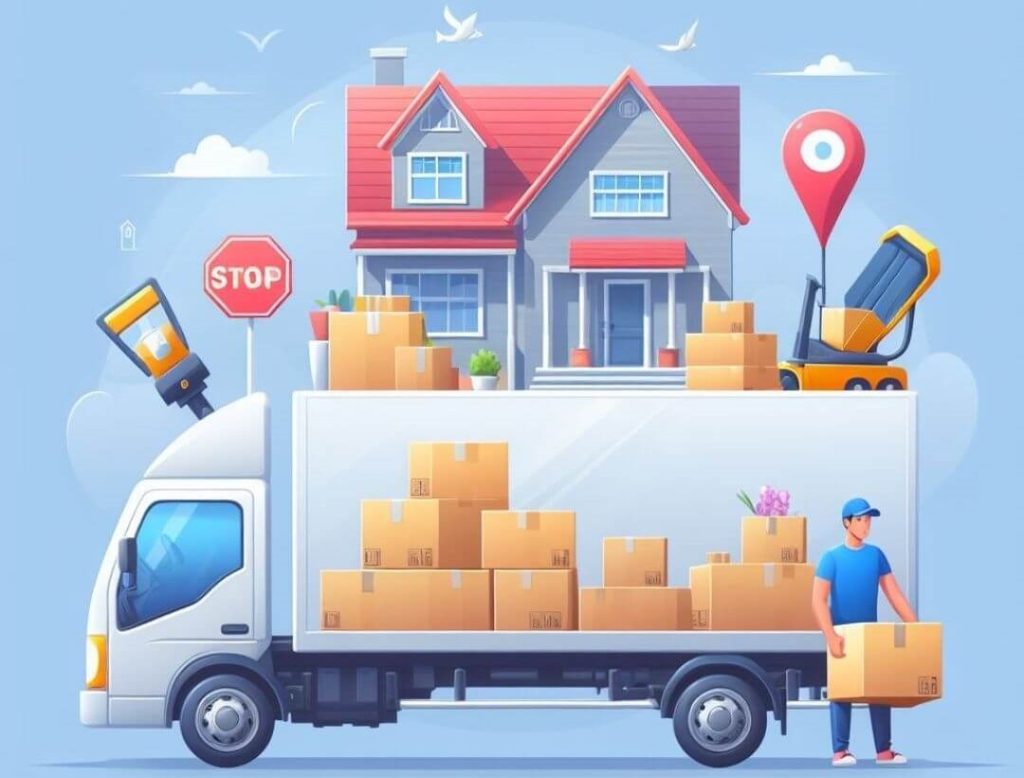How Freight Transport Services Ensure Timely Delivery for Retailers

The success of retailers, both online and brick-and-mortar, hinges on the timely delivery of products to their customers. A key component in achieving this efficiency is freight transport—an essential service that ensures goods are delivered quickly and safely from manufacturers to stores or directly to consumers. In today’s competitive market, where consumers expect fast and reliable delivery, freight transport services play a critical role in ensuring that retailers meet their customers’ demands. This article explores how freight transport services contribute to the timely delivery of goods and the strategies they use to ensure reliability and efficiency.
1. Efficient Route Planning
One of the most crucial aspects of timely delivery is the efficiency of the route taken by freight transport services. Whether goods are shipped by land, air, or sea, route optimization plays a pivotal role in minimizing delays and reducing transit times. Freight transport companies employ advanced technology and algorithms to plan the most efficient routes based on traffic patterns, weather conditions, and infrastructure availability. By considering variables such as road closures, congestion, and geographic obstacles, these companies can ensure that deliveries reach their destination in the shortest possible time. The result is improved punctuality, enabling retailers to fulfill customer orders quickly and effectively.
2. Multimodal Transportation
Freight transport services frequently rely on multimodal transportation, which involves using a combination of different transportation modes, such as road, rail, sea, and air, to deliver goods. This approach allows retailers to benefit from the speed of air freight for urgent deliveries, the cost-effectiveness of sea freight for bulk shipments, and the flexibility of road or rail transport for domestic or regional deliveries. By integrating these different modes of transport into a single supply chain, freight services can ensure timely deliveries regardless of distance or the nature of the products being transported. Multimodal transport also allows for greater flexibility in responding to unexpected challenges, such as shipping delays or weather disruptions.
3. Real-Time Tracking and Visibility
Today’s consumers and retailers expect real-time updates on the status of their orders. Freight transport companies use tracking technology to provide visibility throughout the entire delivery process. With GPS tracking, RFID tags, and online portals, both retailers and consumers can monitor the movement of goods in real-time. This visibility allows retailers to anticipate potential delays and adjust their operations accordingly, ensuring that they can meet delivery deadlines. Furthermore, it enhances customer satisfaction by providing up-to-the-minute information on the whereabouts of their orders, reducing anxiety and increasing trust in the retailer’s service.
4. Inventory and Supply Chain Coordination
Timely delivery isn’t just about transportation—it’s also about seamless coordination between freight transport services and inventory management. Freight services work in tandem with retailers’ inventory systems to ensure that products are available when needed. By aligning transportation schedules with inventory levels, retailers can avoid stockouts and backorders. Additionally, retailers can plan for seasonal fluctuations in demand by coordinating with freight services to secure additional capacity during peak periods. This coordination ensures that retailers can fulfill orders on time, even during periods of high demand, such as holidays or sales events.
5. Flexible Delivery Options
Freight transport services offer flexibility in delivery options to meet the varying needs of retailers and their customers. For instance, retailers often require expedited shipping for urgent orders or for products that are in high demand. Freight transport companies provide several options for fast delivery, including same-day or next-day delivery, depending on the distance and the mode of transport used. Additionally, freight services can accommodate different types of products, such as perishable goods, fragile items, or oversized shipments, which require special handling and transportation. By offering flexible delivery solutions, freight transport companies help retailers meet the diverse expectations of their customers and ensure timely deliveries across different product categories.
6. Managing Capacity and Demand
The ability to manage capacity is crucial for ensuring that retailers receive their shipments on time, particularly during peak seasons. Freight transport services manage capacity through careful planning and forecasting. By analyzing historical shipping data, freight companies can anticipate demand surges and plan for additional resources or alternative transport options. This proactive approach ensures that retailers do not face delays due to lack of available transport capacity, especially during critical periods such as Black Friday, Christmas, or other major retail events. Freight services also offer scalable solutions, allowing retailers to adjust the volume of shipments according to their needs.
7. Customized Delivery Schedules
To accommodate the specific needs of retailers, freight transport services often provide customized delivery schedules. Retailers may require deliveries at specific times to ensure that products are available for sale when stores open or when e-commerce orders need to be fulfilled. Freight services work with retailers to determine optimal delivery windows and adjust their schedules to match these requirements. Whether a retailer needs morning deliveries to restock shelves or overnight shipping to fulfill online orders, freight companies are able to accommodate such requests, ensuring that retailers maintain smooth operations and meet customer expectations.
8. Handling Delays and Contingencies
Despite the best efforts of freight transport companies, unforeseen events such as weather disruptions, customs delays, or mechanical failures can occasionally cause delays. In such cases, freight transport services have contingency plans in place to minimize the impact on retailers. They use real-time tracking and communication to alert retailers about potential delays, allowing them to adjust their inventory management and customer communication strategies. Additionally, freight companies often have backup routes or alternative transportation options that can be activated to ensure timely delivery. This ability to handle disruptions and keep deliveries on track is a key reason why retailers rely on freight transport services.
9. Collaboration and Communication
Effective communication between retailers and freight transport companies is essential for ensuring timely deliveries. Retailers must provide accurate and up-to-date information about their orders, while freight services must keep retailers informed about the status of shipments. This collaboration ensures that any potential issues are addressed promptly, and that deliveries are executed as planned. Regular communication helps build trust between retailers and freight companies, ensuring that both parties are aligned and working toward the common goal of delivering products to consumers on time.
10. Technology and Innovation
As technology continues to evolve, so too does the ability of freight transport services to improve delivery times and reliability. Innovations such as autonomous vehicles, drones, and smart logistics systems are set to transform the way freight transport operates. For example, drones could expedite the delivery of small items in urban areas, while autonomous trucks could offer more efficient long-distance transportation. These technological advancements will further enhance the ability of freight transport services to ensure timely delivery for retailers, offering more options and greater efficiency in the years to come.
Freight transport services are integral to the timely delivery of products, allowing retailers to meet customer expectations and stay competitive in the market. From efficient route planning and real-time tracking to flexible delivery options and customized schedules, freight services offer solutions that enable retailers to fulfill orders quickly and reliably. By leveraging advanced technology, maintaining communication, and managing capacity effectively, freight transport ensures that goods are delivered on time, helping retailers maintain operational efficiency and customer satisfaction. As the retail landscape continues to evolve, freight transport services will remain a cornerstone of successful supply chain management.

 What Happens After Your Security Alarm Goes Off?
What Happens After Your Security Alarm Goes Off?  How Make-Good Services Ensure Smooth Lease Transitions and Compliance
How Make-Good Services Ensure Smooth Lease Transitions and Compliance  The Shift from Concept to Real-World 3D Build Projects
The Shift from Concept to Real-World 3D Build Projects  Effortless Office Moves in Melbourne
Effortless Office Moves in Melbourne  SEBI’s Latest Regulations for Investment Advisory Services in India
SEBI’s Latest Regulations for Investment Advisory Services in India  Exploring the Most Effective Business Services for Entrepreneurs
Exploring the Most Effective Business Services for Entrepreneurs  The Evolution of Industry: From the Industrial Revolution to the Age of Automation
The Evolution of Industry: From the Industrial Revolution to the Age of Automation